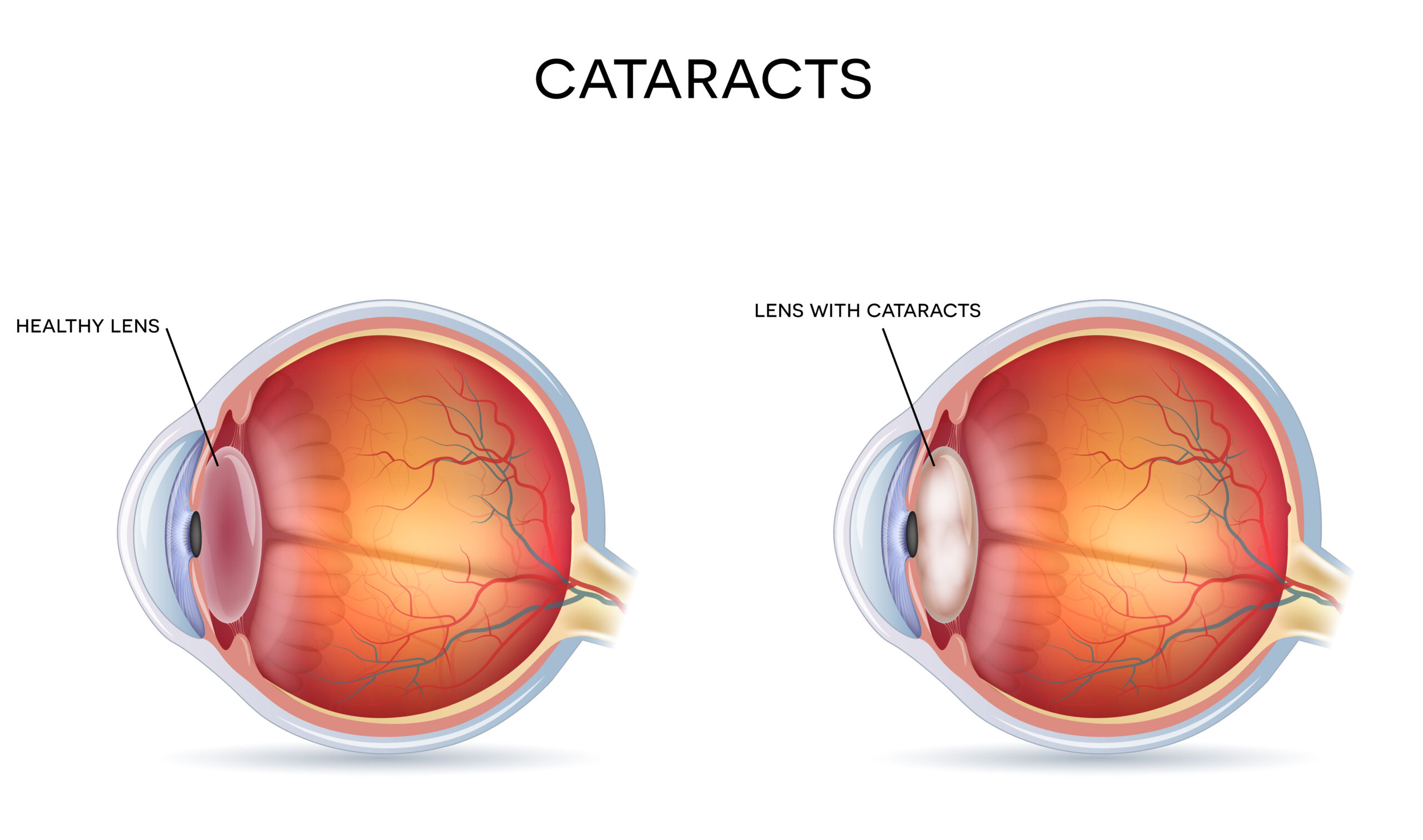Cataracts are one of the leading causes of age-related vision loss. You can also develop cataracts early for reasons like corticosteroid use and eye injuries.
While cataracts can affect your vision, they shouldn’t take over your life. Keep reading to learn more about cataracts, how they can affect you, and why having cataracts doesn’t have to ruin your life.
What are Cataracts?

A cataract occurs when the natural lens in your eye becomes cloudy. Before having cataracts, the lens is usually transparent.
Cataracts happen when proteins in your eye build up on the lens, which plays a crucial role in your eyesight. It bends and focuses light that passes through it on the retina to create sharp, clear images.
As more proteins clump together, your lens becomes more rigid, less transparent, and more cloudy, allowing less light to pass through. Most cataracts develop very slowly over many years or even decades.
What are the Symptoms of Cataracts?
Because cataracts form gradually, symptoms are not always obvious when you have mild or early-stage cataracts. As cataracts develop, you may experience the following symptoms:
- Cloudy or blurred vision
- Difficulty seeing at night
- Double vision in one eye
- Seeing halos around lights
- Sensitivity to light and glare
- Frequent prescription changes
- Colors appearing faded or dull
- Need for brighter lighting for close-up activities
Causes and Risk Factors of Cataracts
Cataracts are a normal part of aging. However, certain factors can increase your risk of developing cataracts at an early age. These include:
- Obesity
- Diabetes
- Smoking
- Past eye procedures
- Previous eye injury
- Excessive sun exposure
- Drinking too much alcohol
- Prolonged use of corticosteroid medications
How Cataracts Affect Your Life
As time goes by, cataracts can worsen and interfere with your eyesight. Poor vision from advanced cataracts can affect your life in many ways, including:
Vision Problems
The symptoms of cataracts, like double vision, sensitivity to light and glare, blurred vision, and poor night vision, can make it harder to complete daily activities like driving, reading, and watching TV. Left untreated, cataracts may eventually cause blindness.

Increased Risk of Falls
Impaired vision from cataracts can make it more difficult to see differences in elevations and obstacles, increasing your risk of slips, trips, and falls. As you age, you’re more likely to suffer from serious injuries due to falling, like hip fractures and head injuries, which may also take a long time to heal.
Social Isolation
Recognizing faces can become increasingly challenging with time when you have cataracts. The world can also grow blurry and difficult to navigate.
These struggles can lead to social isolation. You may avoid public spaces and gatherings where you have difficulty identifying friends and moving around.
Reduced Independence
Cataracts can rob you of the ability to live independently. Being unable to drive, move around safely, shop, read, cook, and complete other routine tasks due to impaired vision from cataracts means being less independent. You may be forced to depend on others for even the most mundane activities due to your vision gradually worsening.
Inability to Enjoy Hobbies and Leisure Activities
Vision problems caused by cataracts can make you less able to participate in leisure activities and hobbies. Life becomes less enjoyable and less fun when you can’t do the things you love.
Cataract Management and Treatment
Once you’re diagnosed with cataracts, your ophthalmologist will recommend more frequent eye exams. Frequent eye exams will enable them to monitor the progression of your cataracts.
When you notice a slight decline in your eyesight, your eye doctor may prescribe stronger glasses or contact lenses. They may also suggest the following tips to help you see better in the early stages of cataracts:
- Using brighter lighting at home to help you read and perform other up-close tasks
- Wearing anti-glare sunglasses to reduce the effects of glare whenever you’re outside
- Reducing glare at home by repositioning lamps so that they’re right behind you, pointed at the task you’re performing, like cooking
However, these are only temporary measures. It may reach a point where these measures no longer help.
If impaired vision from cataracts begins to affect your ability to complete routine activities, you may need cataract surgery. Cataract surgery is the only way to treat cataracts and improve your vision.
The Benefits of Timely Treatment
Advanced cataracts can significantly impact your life. Fortunately, you can treat them with cataract surgery, ensuring they don’t seriously affect your vision. Cataract surgery is a safe and effective procedure that removes cataracts and ensures you can see clearly.
During cataract surgery, your cataract surgeon removes your natural lens and replaces it with an intraocular lens or IOL. The IOL takes over the job of your natural lens and ensures you can see clearly.
Depending on the IOL you choose, you could end up with the best vision of your life. The procedure only takes about thirty minutes, with most patients resuming their usual routine a few days later.

The benefits of cataract surgery extend beyond clear vision. Sharp, crisp vision post cataract surgery improves your quality of life, including increased participation in social activities. You can confidently go out publicly and see family members and friends.
Clear vision after cataract surgery also considerably reduces the risks of car accidents and injuries from falls. Plus, you can enjoy true independence once again.
Any vision lost to cataracts is regained after cataract surgery, enabling you to regain your independence and live the life you want to live. Cataract surgery allows you to return to the activities you love the most, whether watching TV, camping, reading, swimming, or golfing. This contributes to a high quality of life.
Cataract Surgery for Clearer, Healthier Vision
Cataracts can decrease your quality of life. The good news is that having cataract surgery at Evergreen Eye Center means restoring your sharp, clear vision so you can get back to living your life to the fullest.
Has your eyesight become more cloudy, blurred, or sensitive to light and glare? Schedule your cataract consultation today at Evergreen Eye Center. The best vision of your life could be right around the corner. Isn’t it worth finding out about?

